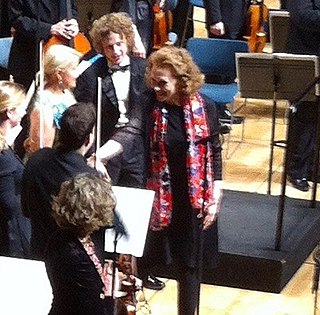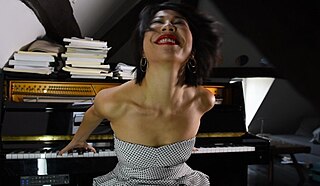Computer music is the application of computing technology in music composition, to help human composers create new music or to have computers independently create music, such as with algorithmic composition programs. It includes the theory and application of new and existing computer software technologies and basic aspects of music, such as sound synthesis, digital signal processing, sound design, sonic diffusion, acoustics, electrical engineering, and psychoacoustics. The field of computer music can trace its roots back to the origins of electronic music, and the first experiments and innovations with electronic instruments at the turn of the 20th century.

IRCAM is a French institute dedicated to the research of music and sound, especially in the fields of avant garde and electro-acoustical art music. It is situated next to, and is organisationally linked with, the Centre Pompidou in Paris. The extension of the building was designed by Renzo Piano and Richard Rogers. Much of the institute is located underground, beneath the fountain to the east of the buildings.

Roger Lee Reynolds is an American composer. He is known for his capacity to integrate diverse ideas and resources, and for the seamless blending of traditional musical sounds with those newly enabled by technology. Beyond composition, his contributions to musical life include mentorship, algorithmic design, engagement with psychoacoustics, writing books and articles, and festival organization.

Max, also known as Max/MSP/Jitter, is a visual programming language for music and multimedia developed and maintained by San Francisco-based software company Cycling '74. Over its more than thirty-year history, it has been used by composers, performers, software designers, researchers, and artists to create recordings, performances, and installations.

Max Vernon Mathews was an American pioneer of computer music.

Kaija Anneli Saariaho was a Finnish composer based in Paris, France. During the course of her career, Saariaho received commissions from the Lincoln Center for the Kronos Quartet and from IRCAM for the Ensemble Intercontemporain, the BBC, the New York Philharmonic, the Salzburg Music Festival, the Théâtre du Châtelet in Paris, and the Finnish National Opera, among others. In a 2019 composers' poll by BBC Music Magazine, Saariaho was ranked the greatest living composer.

The Ensemble intercontemporain (EIC) is a French music ensemble, based in Paris, that is dedicated to contemporary music. Pierre Boulez founded the EIC in 1976 for this purpose.
A laptop orchestra or laptop ensemble (LE) is a chamber music ensemble consisting primarily of laptops. Education based laptop orchestras include SCLOrk , BLOrk, CLOrk, CMLO, HELO, L2OrkOLO, PLOrk, SLOrk, SAMPLE, and ELUNM (Ensamble de Laptops de la Universidad Nacional de Música in Peru. City based laptop orchestras include BiLE, MiLO, and BSBLOrk.

Tod Machover, is a composer and an innovator in the application of technology in music. He is the son of Wilma Machover, a pianist and Carl Machover, a computer scientist.
Virtual orchestra refers to a variety of different types of technologies and art forms. Most commonly used to refer to orchestral simulations, either for pre-recorded or live environments, it also has been used in other ways, such as IRCAM's virtual orchestra database.
Alfio Fazio is an Italian composer of contemporary music.
Dai Fujikura is a Japanese-born composer of contemporary classical music.
Live electronic music is a form of music that can include traditional electronic sound-generating devices, modified electric musical instruments, hacked sound generating technologies, and computers. Initially the practice developed in reaction to sound-based composition for fixed media such as musique concrète, electronic music and early computer music. Musical improvisation often plays a large role in the performance of this music. The timbres of various sounds may be transformed extensively using devices such as amplifiers, filters, ring modulators and other forms of circuitry. Real-time generation and manipulation of audio using live coding is now commonplace.
Oliver Martin Schneller is a German composer and saxophonist.
Orchidée is software developed by IRCAM as a computer-aided orchestration tool.
Marco Stroppa is an Italian composer who writes computer music as well as music for instruments with live electronics.
Marc Battier is a French composer and musicologist.

Jenny Q Chai is a Chinese-American pianist. She is active throughout China, the United States, and Europe, and specializes in contemporary piano music. She is a graduate of the Curtis Institute of Music and the Manhattan School of Music where she earned her Doctor of Musical Arts degree.
Kumiko Omura is a Japanese composer in the field of contemporary instrumental and electronic music.

Dario Palermo is an Italian composer.








